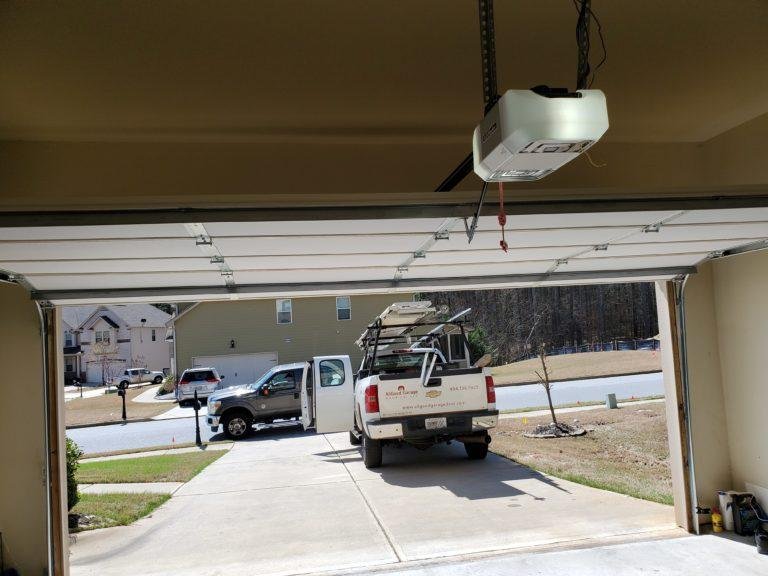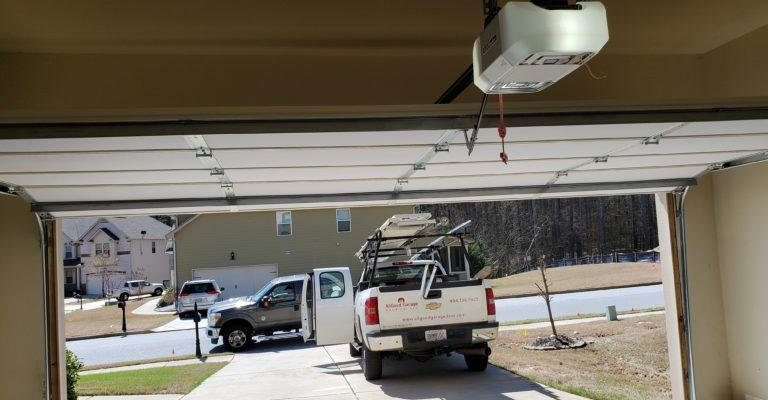
Imagine coming home after a long day, only to have your garage door opener sound like a freight train rolling through your house. Not ideal, right? The discomfort caused by loud noise can affect your quality of life. So, understanding the different noise levels of garage door openers is crucial. In this article, I’ll guide you through why noise matters and what to consider when choosing the right opener for your home.
Understanding Garage Door Opener Types
Before stressing about noise levels, let’s take a closer look at the types of garage door openers. The three main types are chain drive, belt drive, and screw drive. Each of these has a unique mechanism and, consequently, a different noise level.
– Chain Drive Openers: These are the most common and tend to be the noisiest. They operate on a metal chain, making them great for heavy doors but not so great for peaceful evenings.
– Belt Drive Openers: If you’re looking for a quieter option, belt drives are a game changer. They use a rubber belt for movement, making them ideal for homes where noise is a concern.
– Screw Drive Openers: These are another option that generally operates quieter than chain drives but may not be as silent as belt drives. They work using a threaded steel rod, which can offer a balance between noise and cost.
Choosing the right type of opener is essential for your peace of mind and comfort at home.
Why Noise Level Matters
You might be wondering why noise level truly matters when selecting a garage door opener. Well, think about your daily routine. If you’re an early riser who enjoys quiet mornings, a noisy opener could disrupt your peaceful start.
– Impact on Daily Life: A constant loud noise can become a source of stress, especially if your garage door is frequently used throughout the day. Whether you’re leaving for work or coming home late, you don’t want a loud mechanism reminding your entire family—or neighborhood— of your comings and goings.
– Community Considerations: If you live in close quarters, such as a townhouse or apartment, a noisy opener can disturb neighbors as well.
– Resale Value: Lastly, if you ever plan on selling your home, potential buyers may shy away from a property with a garage door opener that rattles the walls. Investing in a quieter model could enhance your home’s value.
Let’s explore how to choose the best noise level for your situation.
Comparing Noise Levels
When comparing noise levels, you’ll often come across a “noise rating” in decibels (dB). Here’s a simple breakdown of what you can expect from different types:
– Chain Drive Openers: Typically measure around 75-80 dB, equivalent to a vacuum cleaner.
– Belt Drive Openers: Usually range from 50-60 dB—similar to normal conversation levels.
– Screw Drive Openers: Fall somewhere in the middle, around 60-70 dB.
Understanding these ratings helps you envision what you’re getting. If a garage opener is too noisy, it might not be worth the convenience, especially if you’re a light sleeper.
Evaluating Your Garage Door’s Size and Weight
Another crucial factor in noise level is the size and weight of your garage door. A heavier door may require a more powerful opener, which can increase the noise level.
– Lighter vs. Heavier Doors: A lightweight garage door can work well with quieter openers, while heavier doors may necessitate noisier chain drives.
– Spring System: The type of spring system also plays a role. Torsion springs tend to be quieter than extension springs, providing a smoother lift that minimizes noise.
Assessing your specific garage door setup allows you to tailor your choice for the best balance between functionality and noise.
Motor Types and Their Noise Impact
The motor type in your garage opener contributes significantly to noise levels. Here’s how the main types stack up:
– AC Motors: These are powerful and typically found in chain drives. However, they can be quite loud, especially under heavy loads.
– DC Motors: Generally quieter and more energy-efficient, DC motors are often used in belt drives. They provide smooth operation and are usually preferred if you’re worried about noise.
Keep in mind that the motor can affect not only noise but how smoothly your garage door operates. Choosing an opener with a high-quality motor can reduce vibrations—another source of noise.
Sound Insulation Options
If you decide on a noisier opener or have an existing one, you can employ sound insulation methods to reduce the impact.
– Garage Door Seals: Adding weather stripping along the sides and bottom of your garage door can minimize sound escaping and make it quieter.
– Sound-Absorbing Panels: You can install these on the walls or ceiling of your garage to absorb some of the noise.
– Vibration Dampeners: These can be placed under the motor housing to reduce vibration noise when the door opens and closes.
Using these methods, you can enhance your overall comfort and enjoy a more serene atmosphere in your garage space.
Testing and Reviews
Before making a purchase, it’s wise to do some research. Reading reviews from verified buyers can give insight into the true noise levels of various garage door openers.
– Listen for Yourself: If you’re comfortable visiting a store, ask to hear different models in action. Some retailers even have working models you can test out.
– Check Online Forums: Home improvement forums often have discussions where real homeowners share their experiences regarding noise levels. You might discover valuable tips about which models operate quietly.
Gathering this information ensures that you select a model that suits your noise tolerance and lifestyle needs.
Long-Term Considerations for Noise Level
When you think about purchasing a garage door opener, it’s essential to consider how noise levels affect you in the long run.
– Future Homeowners: As time passes, your needs may change. If you move to a quieter area or your family grows, having a lower noise level becomes increasingly important.
– Maintenance Costs: A quieter opener may have fewer maintenance issues, reducing your overall costs. Quieter models often come with mechanisms designed for durability.
By evaluating how noise fits into your long-term plans, you can make an informed decision that remains relevant for years to come.
Budgeting for a Quiet Garage Door Opener
Price is always a consideration, and like many things, quieter garage door openers can be more expensive but also offer more value.
– Initial Cost vs. Long-Term Value: Spending a bit more upfront may save you headaches later. A quality belt drive, though pricier, might last longer and operate more quietly than a cheaper chain drive.
– Consider Additionals: Think about if you need additional components like battery backup or smart features, as these can also influence the overall cost but may provide more convenience.
A well-planned budget means you’ll find a garage door opener that fits your needs without compromising your peace and comfort.
Final Thoughts on Noise Levels and Garage Door Openers
As you can see, the noise level of a garage door opener is a significant factor that shouldn’t be ignored. Choosing an opener that suits your living situation—be it a belt drive for quiet operation or ensuring soundproofing methods—is essential for enjoying your home fully. After all, your garage door opener should be a help, not a hindrance.
By taking into account your garage door type, motor choice, and insulation options, you can find something that works effortlessly and quietly. Here’s hoping your next garage door opener blends seamlessly into your life—quietly!
